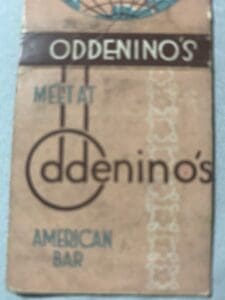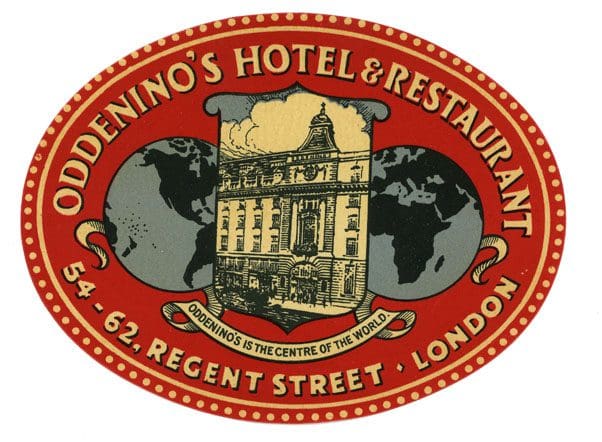

The first Oddenino to arrive in America was Giuseppe Domenico Felipe Oddenino. Giuseppe was born on August 23, 1831, in Chieri near Torino, Italy. His family owned and operated a linen factory in Chieri. Family stories passed down suggest that his first love was art and that he felt in America, he could pursue a career in art without the social limitations he experienced in Italy, as his family's social status did not look kindly on lowly artists. He left his wife Celina and son Luigi to pursue his dreams.
He arrived in New York in March 1862 in time to enlist in the Union Army during the Civil War. His Civil War records reflect that he was in Company B, 5th Regiment of the New York Heavy Artillery. New York In The War of Rebellion (1912) by Frederick Phisterer indicates that while the company saw action in a number of engagements, the majority of the unit and the majority of the time was involved in garrison duty, especially in the Washington, D.C. area. Civil War pension records indicate that Joseph, as he was known in America, was on detached duty with the regimental band on June 20, 1864. Joseph's Civil War records are set forth below, but first, let's take a look at the artwork he did and the various stories about that art.
Joseph was honorably discharged from the service in March 1865 at Harper's Ferry, West Virginia. After the Civil War, he settled in the Piedmont region of Virginia, as it reminded him of his home in the Piedmont region of northern Italy. Joseph settled in Madison County, Virginia, and also lived in Culpeper, Virginia, and Orange County, Virginia. Orange County, Virginia, boasts a fascinating history in which Joseph Oddenino played a small role. Joseph made a name for himself as an artist in the Piedmont region of Virginia, and his artwork may be viewed below.
Click here for a look at the historical events that took place during Joseph's life.
Here is a map of central Virginia with the Madison and Aroda areas highlighted in yellow:
Family reports are that he worked giving music lessons (which is consistent with his service in the regimental band during the Civil War) and, more famously, as a "hobo artist." Where the "hobo" comes from we cannot say, but he definitely worked as an artist. He painted the Hebron Lutheran Church, in 1885. It took him one year, and he was paid $1,000.00. It is thought he did the six panels, while the two remaining ones on either side of the pulpit are thought to be imitations of Joseph’s work. Roy Crigler, then a child of age six or seven, was the only one Joseph would allow being with him while he worked at the church.
He also painted the Culpeper Courthouse, which was recently restored to preserve the interior artwork of Joseph. And, most famously, he painted the interior of Mitchell's Presbyterian Church. A view of Joseph's trompe l'oeil style of art is beautifully seen in the interior of Mitchell's Church, where the only beams and columns are in the mind's eye:
The Mitchell's Presbyterian Church has been the subject of important restoration work and research. Below is a pamphlet on Joseph's work.
One of the lesser-known works of Joseph Oddenino can be found at the Masonic Lodge in Madison, Virginia. The painting on the ceiling is called the "Queen of the Angels" and demonstrates another aspect of Joseph Oddenino's range of talent. These photos were taken by Jane Oddenino, great-granddaughter of Joseph, in 1998:


There have been numerous newspaper articles on Joseph Oddenino and his art.
Below are a few samples.
Articles on Joseph Oddenino's art in the Mitchell's Church:


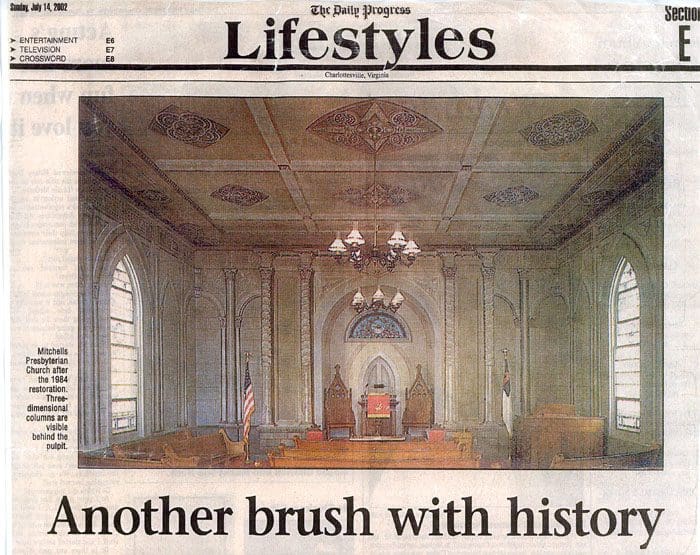
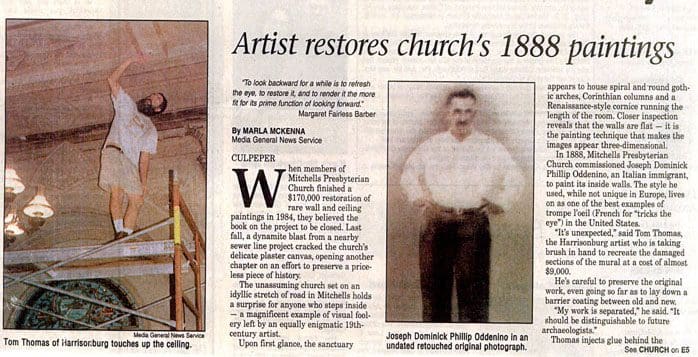

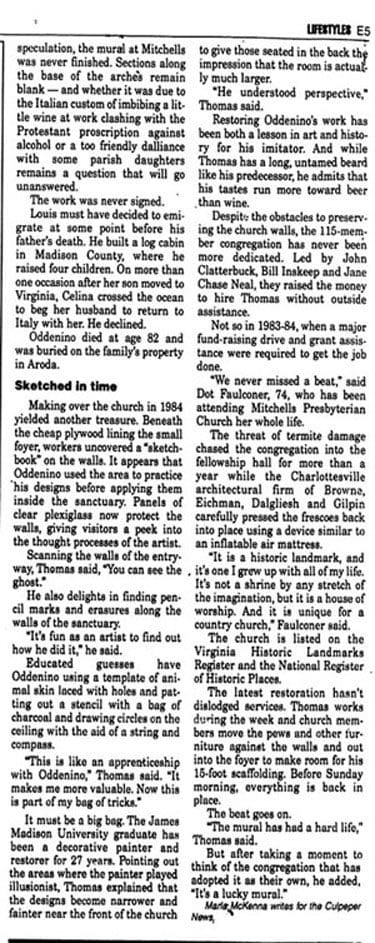
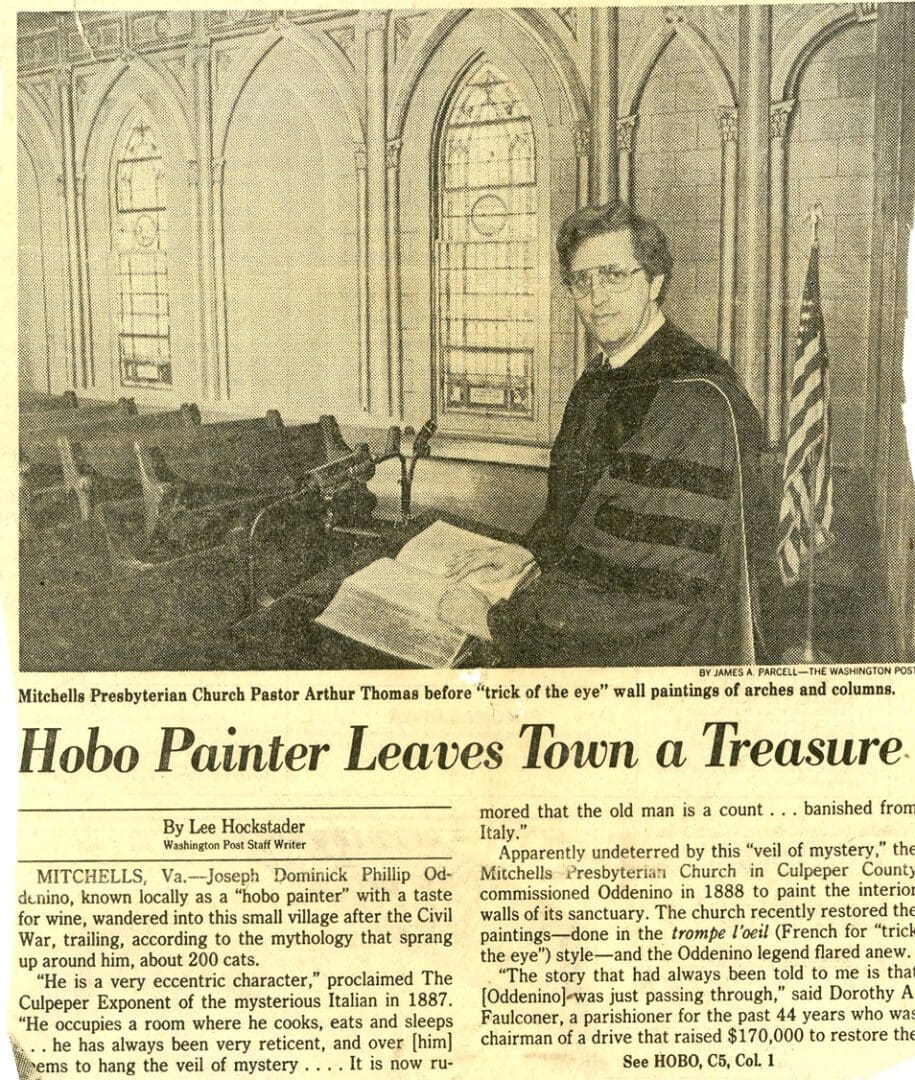
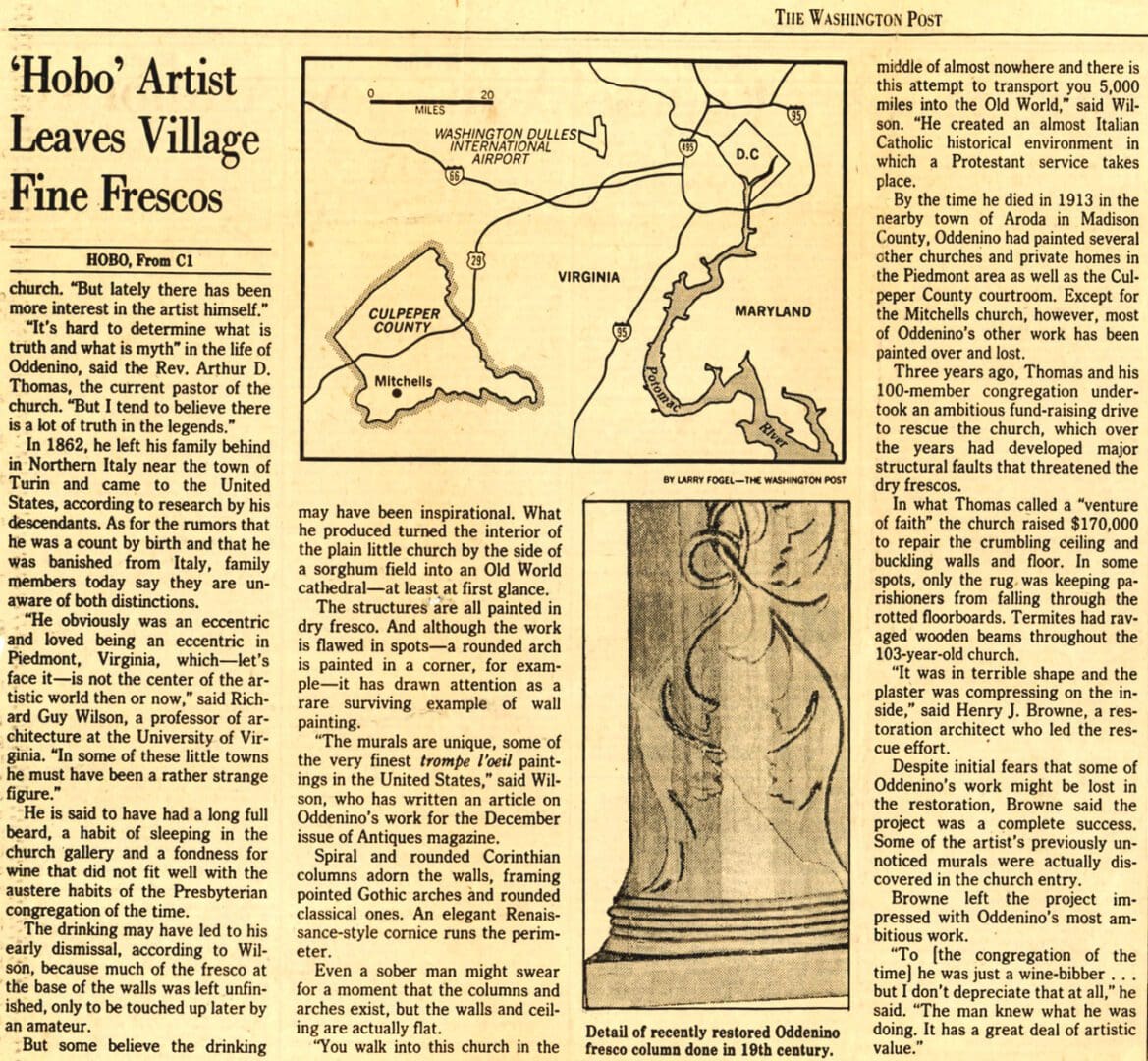
Article on Joseph Oddenino's art at the Hebron Luthern:
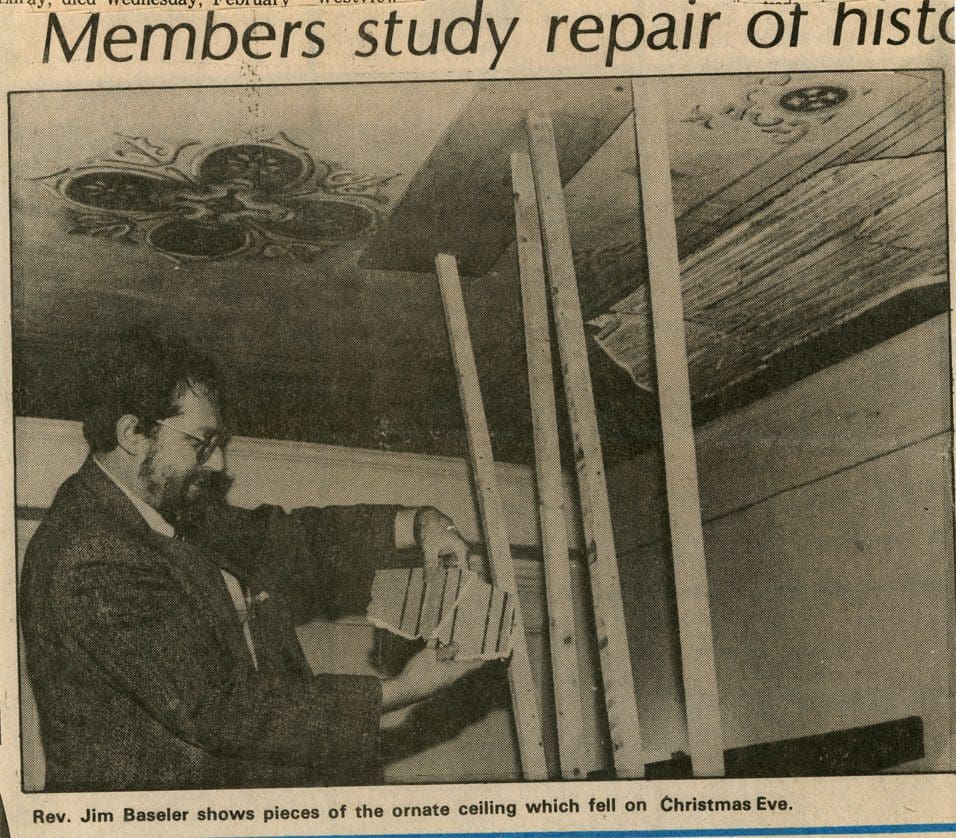
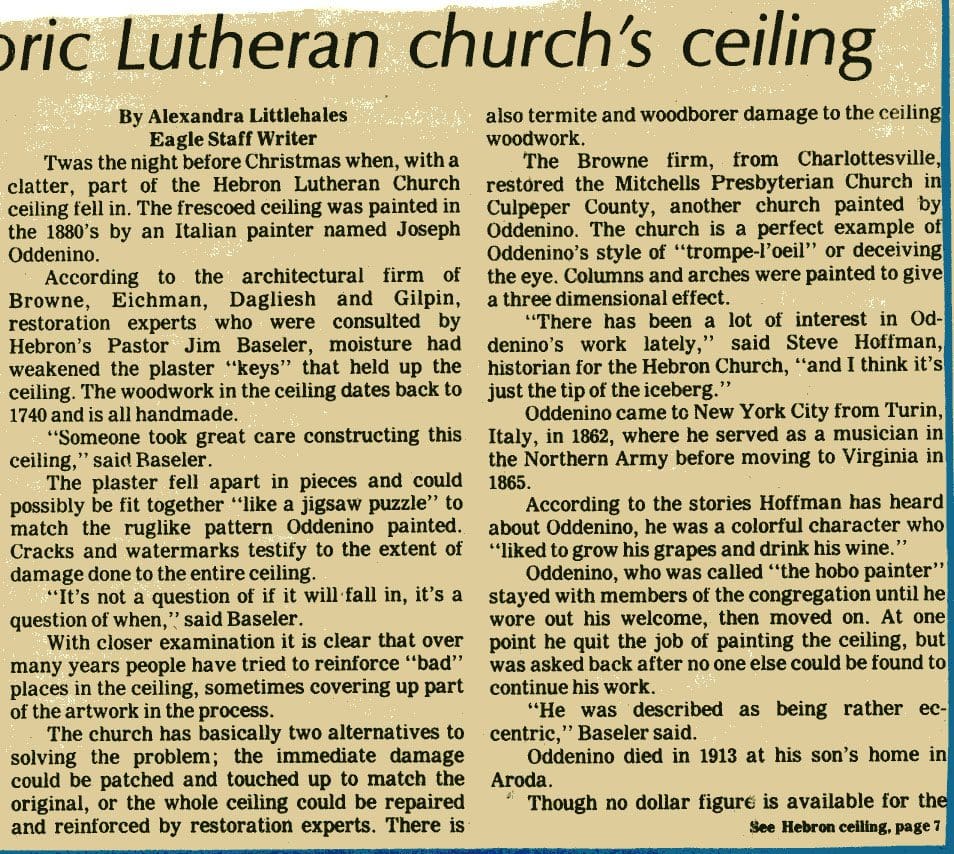

Article on the Hebron Lutheran Church Rededication:
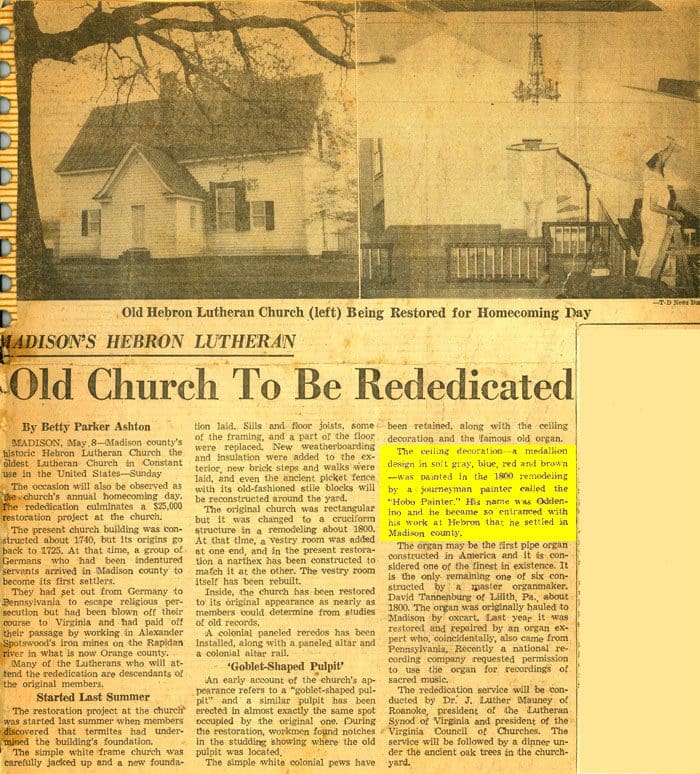
From the Madison County Eagle, July 12, 1990:
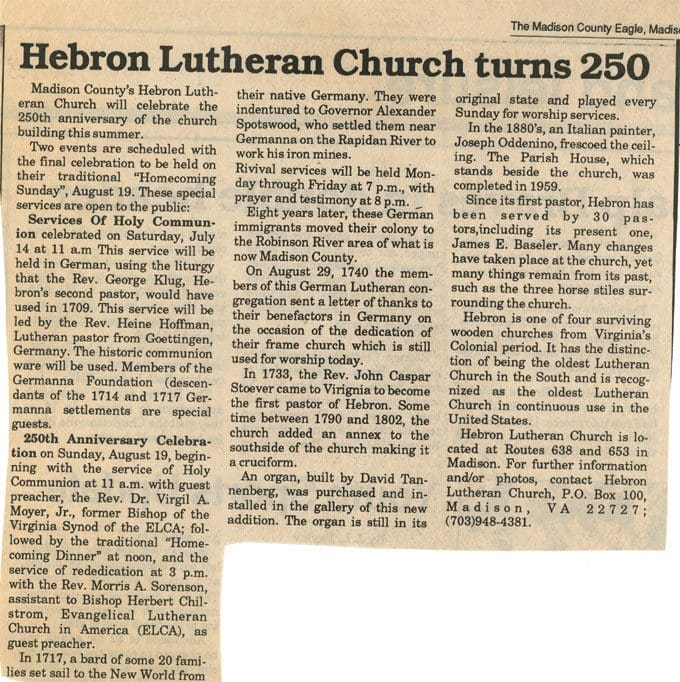
Article on Joseph Oddenino's art at the Culpeper Courthouse:
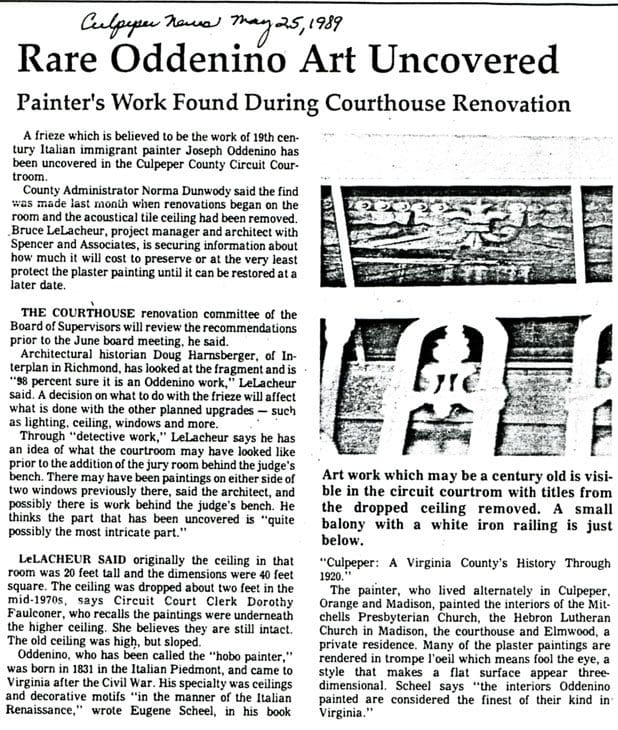
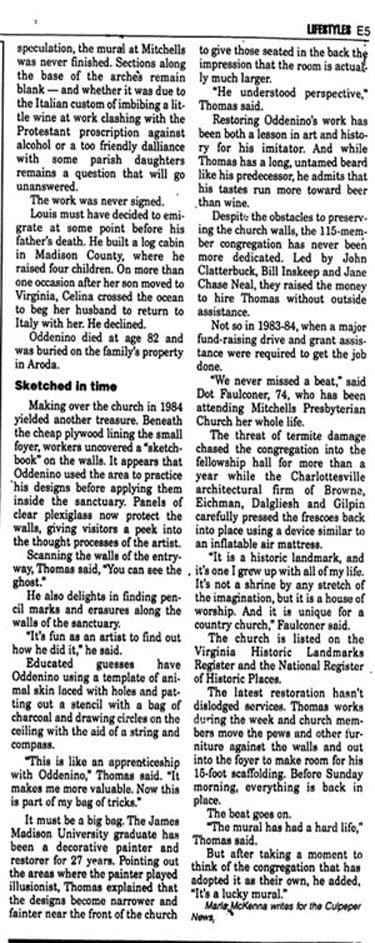
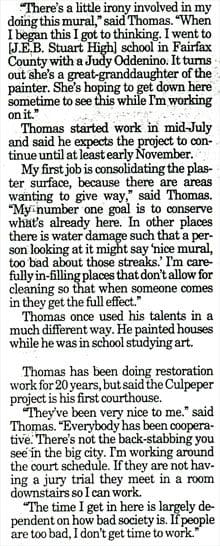
Here is a close-up of the restoration work on the Culpeper Court
House. The restored work is on the left.
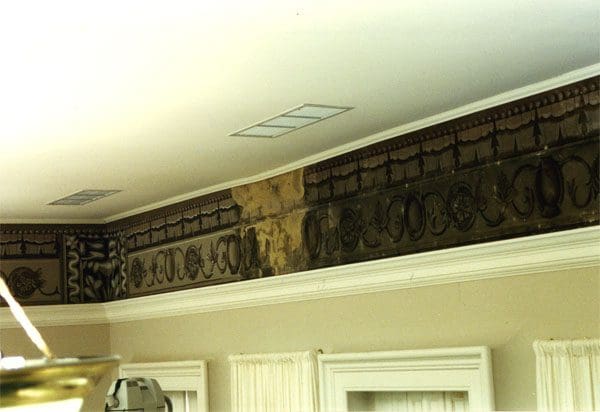
His career as an artist after the Civil War apparently took its toll on his body based on the following pension application of 1892:
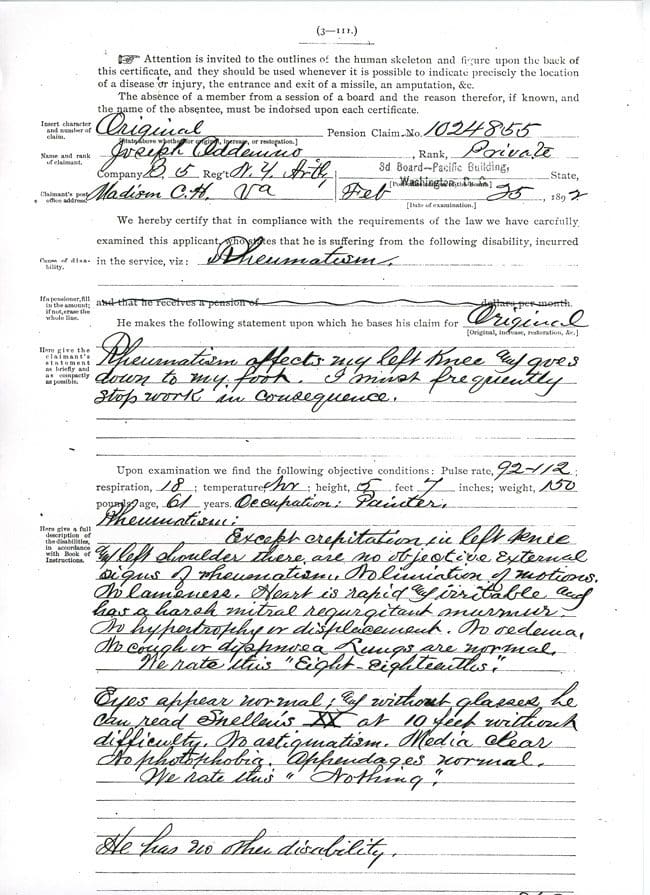

Thanks to research done by Joseph's great-grandson Charles Oddenino, we are able to share a complete listing of Joseph's Civil War assignments.
The following is a listing of dates and places where the unit was stationed during the Civil War from March 1862 to June 1865. Taken from records at the National Archives, Washington, DC.
Served as a musician in the Civil War with Company "B", 5th Regiment of the New York Heavy Artillery, Union Army.
Dates
March-April 1862
May-June 1862
July-August 1862
Sept-Oct 1862
Nov-Dec 1862
Jan-Feb 1863
March-April 1863
Station of Company
Stewarts Woods, Baltimore, MD
Fort Marshall, Baltimore, MD
Fort Marshall, Baltimore, MD
Fort Marshall, Baltimore, MD
Fort Marshall, Baltimore, MD
Fort Marshall, Baltimore, MD
Maryland Heights, MD
NOTE: Changed station from Fort McHenry, MD to Maryland Heights on the 30th day of April 1863.
May-June 1863 Stewarts Woods, MD
NOTE: Changed station from Harpers Ferry, MD to Fort McHenry, MD, May 21,
1863.
Changed station to Havre De Grace, MD, May 28, 1863.
Changed station to Fort Marshall, MD, June 21, 1863.
Changed station to Stewarts Woods, June 27, 1863.
July-August 1863
Sept-Oct 1863
Nov-Dec 1863
Stewarts Woods, Baltimore, MD
Stewarts Woods, Baltimore, MD
Fort Goons, Baltimore, MD
Company marched to Gettysburg, PA November 16,1863, returned to this Post on November 21, 1863.
Jan-Feb 1864
Mar-Apr 1864
May-June 1864
Jul-Aug 1864
Fort No. 1 (?), Baltimore, MD
Camp Hill, Harpers Ferry, MD
Kanawa Falls, West Virginia, Gauley Bridge
Harpers Ferry, Virginia
Left Gauley Bridge, VA and proceeded by River to Parkersburge, Va. then by Road to Cherry Run, VA. Encamped for 3 days. Left Cherry Run, VA and marched by way of Martinsburg, VA to Smokins (?) Smokers Gap; was engaged in action at that place on 18 July 1864.
Marched from there to Winchester, VA where encamped for 3 days. Left Winchester July 25, 1864 arriving at Harpers Ferry July 28, 1864 where Company had since been stationed Sep-Oct 1864 Camp Hill, Harpers Ferry doing Garrison Duty. Guards at Sandy Point, MD and furnishing escorts of personnel to Baltimore, Point Look-Out and to Washington, DC. Nov-Dec 1864 - Camp Hill, Harpers Ferry, MD. Guard Duty and escorts, as above.
Jan-Feb 1865
Mar-Apr 1865
May-Jun 1865
Camp Hill, Harpers Ferry, MD
Camp Hill, Harpers Ferry, VA
Camp 11, Harpers Ferry, VA
NOTES by researcher, Charles Oddenino (great-grandson of Joseph Oddenino):
Gauley Bridge, VA is now Gauley Bridge, West VA and is located just North of Lewisburg, West VA. It is a very long bridge crossing the New River.
Smokins Gap at Smokers Gap which is not clear on copy of records is some place between Martinsburg, now West VA and Winchester, VA and is the only place where the Company is reported to have engaged in action or battle.
More pension records of Joseph Oddenino provide some documentary history:
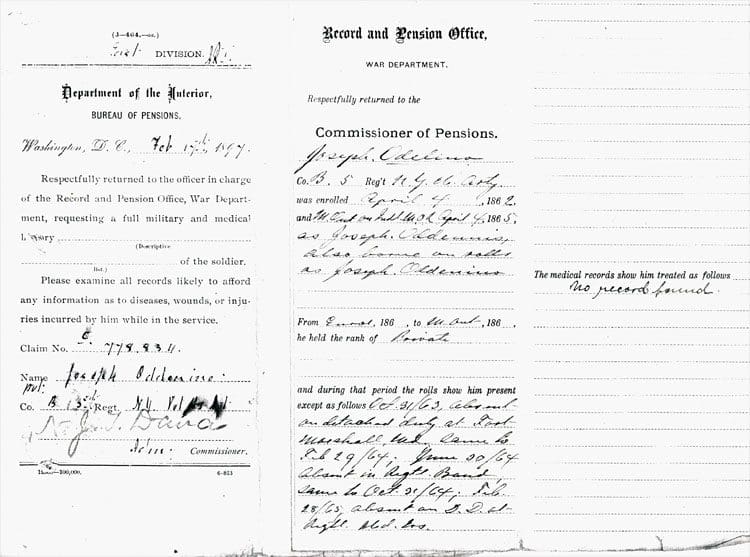
Here is one of the Civil War pension documents of Joseph Oddenino from 1898:
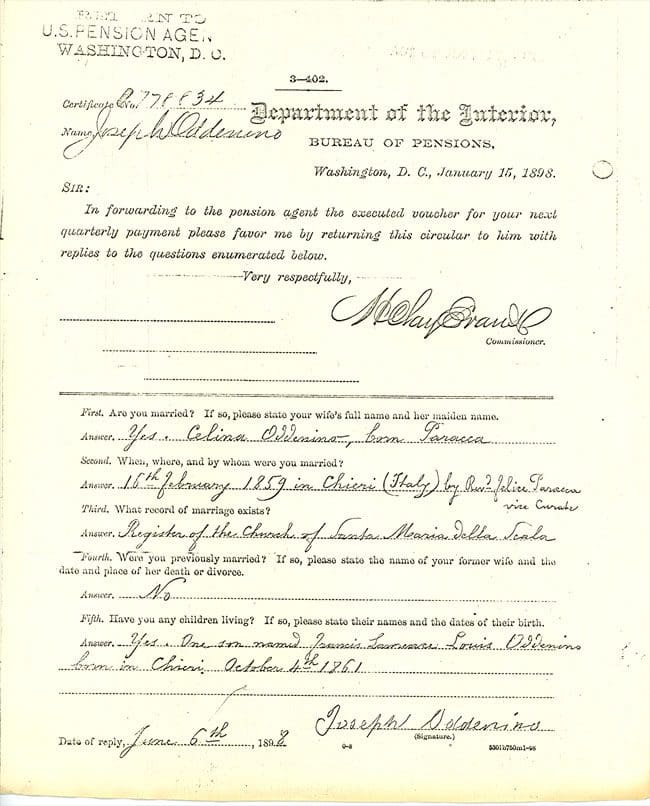
Here is another interesting pension document from 1907:
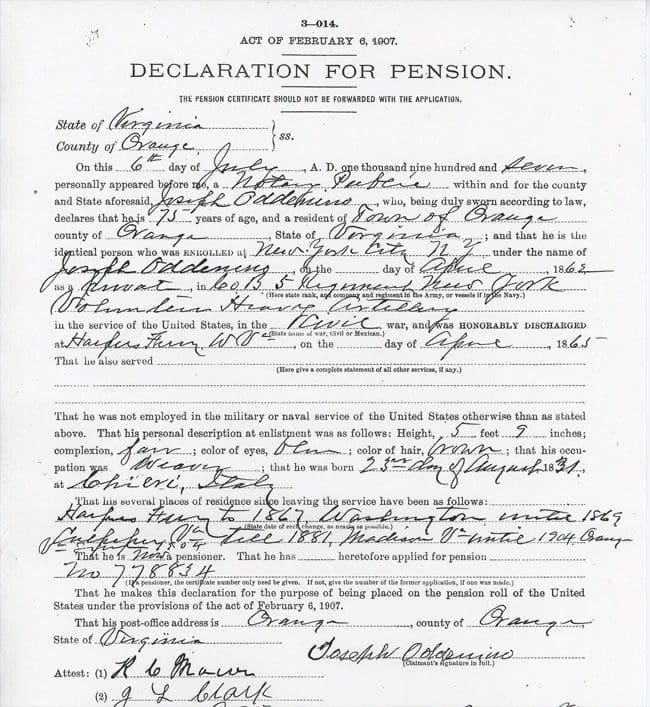
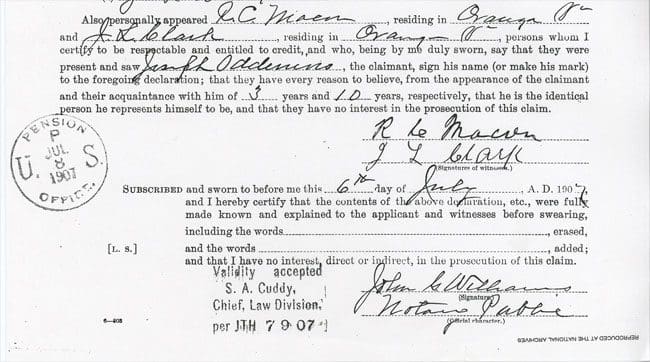
And one from 1912:
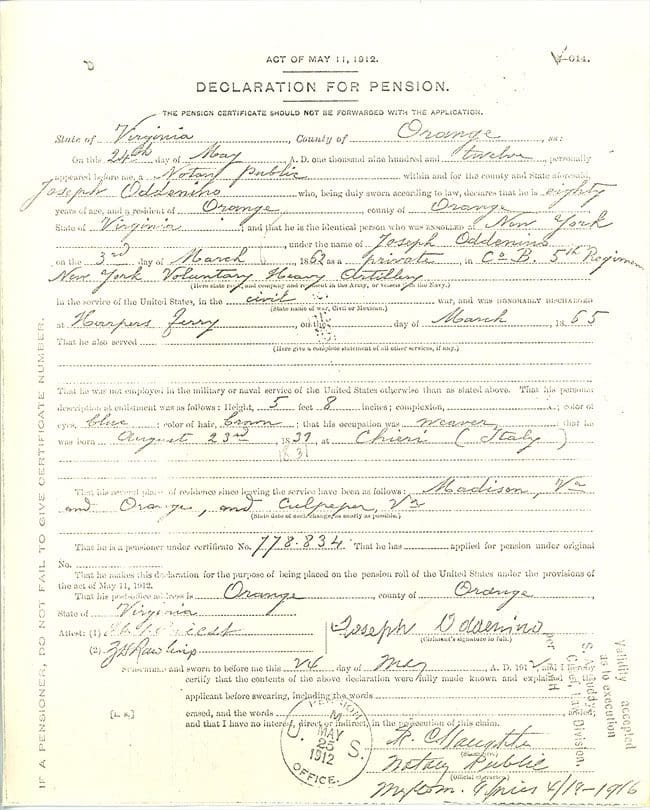
Here is a road sign near the Mitchell's Church
commemorating Joseph's work:
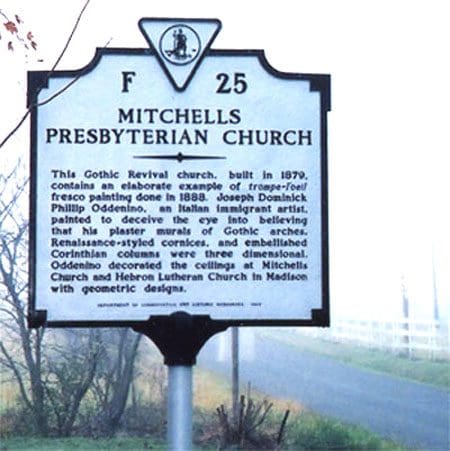
Joseph died on September 23, 1913 at the home of his son Luigi (Frances Lawrence Louis Oddenino) in Aroda, Madison County, Virginia at the age of 82. Here is his death certificate on file in the Commonwealth of Virginia at Richmond, Virginia:
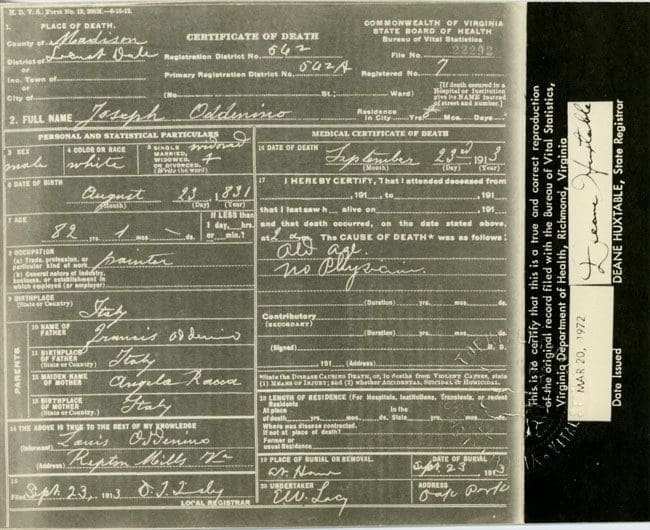
Joseph is buried in the family cemetery at the Aroda home which is now owned by one of his great-granddaughters.
Tombstone of Joseph Oddenino in family cemetery in Aroda, Virginia:
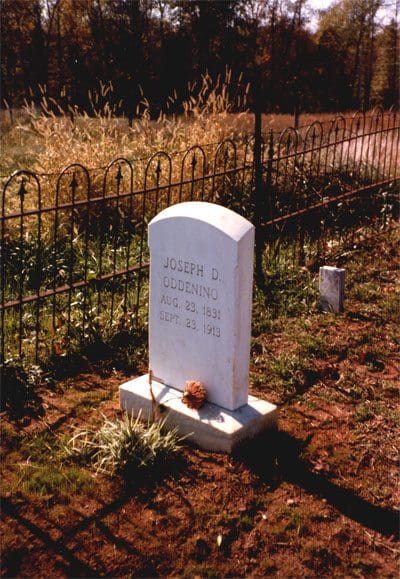
During the last years of his life, Joseph lived in a log cabin on the Aroda property which later served as the living quarters for his great-grandsons:
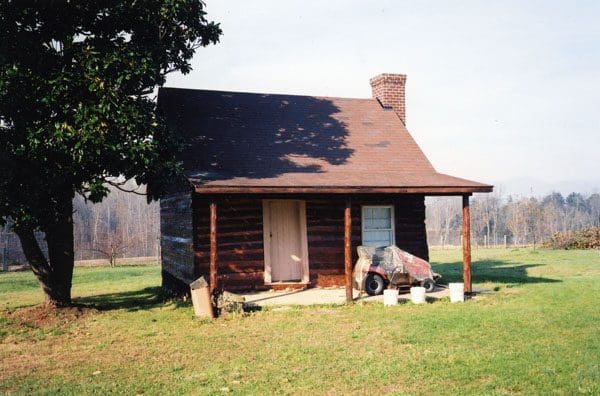
Below is another view of the cabin which is currently owned and has been restored by Joseph Oddenino's great-granddaughter, Anne Oddenino Smonskey and her husband Frank Smonskey:

|
|---|
|
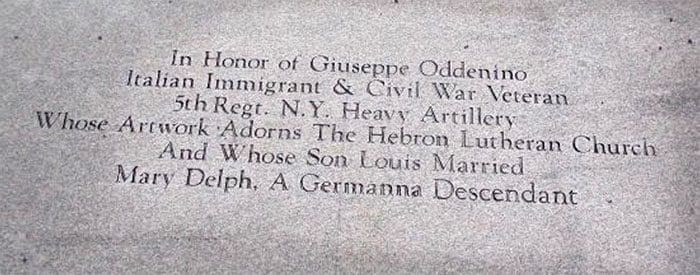
Joseph's life and work is now remembered and appreciated by those of us who come after him. What truly motivated his decision to emigrate from Italy to America in 1862, we will probably never know, but we do know that his decision to do so reverberates for many of us to this day.
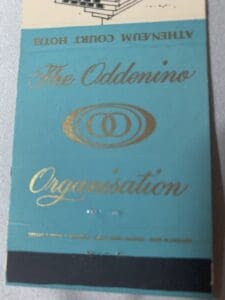
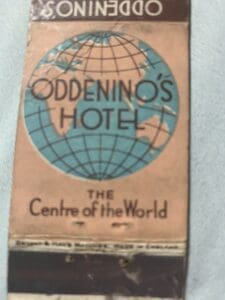 The former Oddenino's Hotel in London, England was started by a relative who immigrated to England from Italy.
The former Oddenino's Hotel in London, England was started by a relative who immigrated to England from Italy.
Click here for an article on Oddenino's Restaurant in London.
